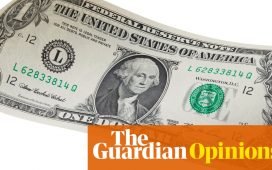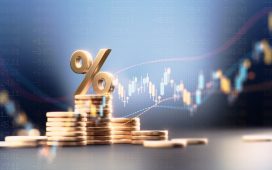France’s Cac 40 index surges 2.6% in early trades
European stock markets are up across the board after the French election result.
They are led by the Cac 40, France’s benchmark, which has surged by 2.6% at the opening bell.
Spain’s Ibex is up 1.5%, Italy’s FTSE MIB is up 1.8% and the Europe-wide Euro Stoxx 600 index has gained 1%. Despite more expected signs of weak economic growth, even Germany’s Dax has edged up by 0.2%.
Key events
Holger Schmieding, chief economist at Berenberg, a German investment bank, said the French election result was “not worse than expected”.
Marine Le Pen’s National Rally (RN) and its allies received 33% of the national popular vote, with the leftwing New Popular Front in second with 28%. President Emmanuel Macron’s centrist bloc was third on 20% of the vote.
Schmieding said RN’s vote share was two points below opinion polling, meaning “a hung parliament remains the most likely outcome”. RN could still win an absolute majority in the second round on Sunday 7 July, but that “now looks even slightly less likely than it did before”, he wrote in a note to clients.
He also noted that the possibility that the leftwing coalition could “take power and implement its costly agenda seems to have receded further”. (Investors have generally not been in favour of the potentially free-spending leftwing coalition.)
Schmieding sketches out three scenarios (quoted here in full):
-
Gridlock: The most likely outcome remains a hung parliament in which neither the far right nor the united left nor the Macron’s centrists can muster a majority. In this case, any (new) government would not get much done.
-
Worse than gridlock: Although the united left and RN are polar opposites on issues of migration, culture and identity, they have all opposed Macron’s pro-growth reforms. As a result, we see a risk that Le Pen’s party and parts of the left may still join forces in a hung parliament on a few select issues to soften Macron’s pension reform and enhance the “purchasing power” of citizens, for instance through lower VAT on energy products or via additional subsidies.
-
Marine Meloni: With a significantly lower probability than the first two scenarios, Le Pen’s party may still win a majority of seats and install RN boss Jordan Bardella as prime minister. If so, she would probably focus on winning the 2027 presidential election, staying on the more moderate track which she has signalled during the campaign. She may concentrate on some signature policies (e.g. being tough on immigration) rather than on expensive or disruptive fiscal promises. Put differently, Le Pen may try to largely follow the example of Italy’s prime minister Giorgia Meloni. To do so, she may possibly explain to RN voters after a lengthy fiscal review that most of her original fiscal ideas could only be implemented slowly over time – or only if she became president in 2027.
Schmieding sees “a change for the worse” after Macron’s “pro-growth economic reforms”. He thinks they will mean higher spending relative to government income, plus a much more combative relationship with the EU.
Back on the French election fall-out, let’s look at what economists have had to say this morning.
Marine Le Pen, leader of the victorious National Rally, formerly called for France to leave the euro currency and the EU. She has done her best to distance herself from any anti-euro sentiments in recent times, realising they are unpopular with people whose savings are in euros, but concerns over the future of Europe have been a major part of investor concerns over a far-right government.
A hung parliament – as indicated by the first round of voting – would assuage some of those concerns. However, it could also stop Macron from making changes such as pension reforms that might boost economic growth, but which have proven unpopular with voters.
Mohit Kumar, chief economist of Jefferies investment bank, said:
The result is probably better-than-feared, but not as good as the status three weeks ago pre-elections.
We could still be looking at the next few years of political paralysis in France with a stalling of the reform process. However, any fears of Frexit or a euro area breakup would be unfounded.
Two-year recession for European manufacturing sector
Output from Europe’s manufacturing sector dropped in June as Germany’s economy continued to struggle, according to a closely followed index. That marked two years of contraction for the sector.
The purchasing managers’ index (PMI) for the eurozone dropped from 47.3 points in May to 45.8 in June, according to S&P Global.
Germany’s enormous manufacturing sector is usually the powerhouse of Europe, but it has now been in contractionary territory for two years, according to the PMI reading.
The latest Germany reading for June came in at 43.5, a marked drop from May’s 45.4 reading. That was marginally better than expectations, but remains well below the 50-point mark that denotes expansion.
Cyrus de la Rubia, chief economist at Hamburg Commercial Bank, said:
We are inclined to see this more as a temporary blip rather than a sign of a prolonged downturn. Manufacturing growth was seen in other parts of the world in June, such as the United States, UK, and India, according to their respective Flash PMI. This global recovery provides a supportive backdrop for Eurozone manufacturers.
Additionally, optimism about future production remains as high as it was in May, indicating that businesses are still confident about the coming year.
UK house price rises pick up pace slightly in June
UK house prices rose by 1.5% in the year to June, a slight acceleration compared to 1.3% in the year to May, according to lender Nationwide.
During June prices rose by 0.2% to an average of £266,604.
The relatively slow pace of increases – certainly compared to the run of the last decade – is mostly down to higher interest rates, according to Robert Gardner, Nationwide’s chief economist. He said:
Housing market activity has been broadly flat over the last year, with the total number of transactions down by around 15% compared with 2019 levels. Transactions involving a mortgage are down even more (nearly 25%), reflecting the impact of higher borrowing costs. By contrast, the volume of cash transactions is actually around 5% above pre-pandemic levels.
While earnings growth has been much stronger than house price growth in recent years, this hasn’t been enough to offset the impact of higher mortgage rates, which are still well above the record lows prevailing in 2021 in the wake of the pandemic.
The biggest price increases were in Northern Ireland, up 4.1% compared with the second quarter of 2023. Across England overall, prices were up 0.6% year-on-year, while Wales and Scotland both saw a 1.4% year-on-year rise.
Prices fell 0.3% across southern England in the second quarter compared to a year earlier.
Boeing buys supplier Spirit, with Airbus to gain $559m from deal
Boeing has bought supplier Spirit Aerosystems for $4.7bn, reversing a move 19 years ago to spin out the fuselage manufacturer.
The US planemaker is taking control of Spirit in response to a series of manufacturing issues – including a blown-out door panel in January – that have plunged it back into crisis mode just as it thought it was emerging from the shadow of two crashes of its bestselling 737 Max jet.
It may not be listed in France, but Toulouse-headquartered Airbus is another big gainer on stock markets this morning. The Amsterdam-listed planemaker may be benefiting from the broader rally, but its shares are up 2.8% after it said it will gain $559m (£441m) in compensation.
Airbus will take over manufacturer of fuselage sections for the A350 jet in Kinston, North Carolina, and St Nazaire, France, A220 pylons in Wichita, Kansas, and of the A220’s wings and mid-fuselage in Belfast, Northern Ireland, and Casablanca, Morocco.
Boeing chief executive Dave Calhoun, who retires later this year, said:
We believe this deal is in the best interest of the flying public, our airline customers, the employees of Spirit and Boeing, our shareholders and the country more broadly.
By reintegrating Spirit, we can fully align our commercial production systems, including our safety and quality management systems, and our workforce to the same priorities, incentives and outcomes – centered on safety and quality.
French banks are leading the gains on the Cac 40 index in early trading, as investors predict a hung parliament following the first round of parliamentary elections.
The share price of every company in the French benchmark index has risen so far today.
Société Générale is the top gainer, up 6.4%, with Crédit Agricole and BNP Paribas both up 4.8%.
French airports and construction company Vinci, which has a large number of government contracts, is up 4.9%. Energy utility Engie and waste and water company Veolia have risen 4.5% and 3.7% respectively.
The FTSE 100 in London has also gained in the first few minutes of trading.
It is up 0.6%. The biggest riser is property investment trust Landsec, up 3%, followed by energy company Centrica, up 2.4%.
France’s Cac 40 index surges 2.6% in early trades
European stock markets are up across the board after the French election result.
They are led by the Cac 40, France’s benchmark, which has surged by 2.6% at the opening bell.
Spain’s Ibex is up 1.5%, Italy’s FTSE MIB is up 1.8% and the Europe-wide Euro Stoxx 600 index has gained 1%. Despite more expected signs of weak economic growth, even Germany’s Dax has edged up by 0.2%.
Euro hits two-week high after first round of France election
Good morning, and welcome to our live, rolling coverage of business, economics and financial markets.
France’s far-right has won the first round of the country’s two-stage parliamentary elections, in a result that suggests it could be the largest party for the first time since the second world war. It is a seismic political result for Marine Le Pen’s National Rally, but financial markets have remained relatively steady as investors look to the prospect of a hung parliament.
Analysts at Deutsche Bank led by Jim Reid wrote:
The first round of the French elections perhaps delivered a slightly less convincing victory for the far-right than final polls suggested and with other parties now seemingly open to form alliances in the second round, this is likely to further reduce the far-right’s chance of an overall majority in parliament.
A hung parliament would make it very difficult for any single party to push through a legislative agenda – particularly given the main left- and rightwing parties’ cordon sanitaire against working with the far right.
Here is a round-up of the different movements on Europe’s financial markets so far:
The euro has gained against the US dollar. The single currency rose by 0.55% to $1.0771, after hitting its highest level in more than two weeks.
The difference in yield between French and German bonds (AKA the spread) is generally seen as a key measure of risk appetite from investors. On the evidence of this morning, they are hopeful that a hung parliament could reduce any chance of a radical economic agenda in the next few years.
The below chart shows how the spread has narrowed from 79 basis points (0.79 percentage points) to 73 basis points. That comes after the spread surge since 10 June, when markets responded to Macron’s shock decision to call a snap poll.
Futures for the Cac 40 suggest France’s benchmark share index will surge by 3% when it opens at 8am BST. The index on Friday hit its lowest level since January.
The agenda
-
8:55am BST: Germany HCOB manufacturing purchasing managers’ index (PMI) (June; previous: 45.4 points; consensus: 43.4)
-
9am BST: Eurozone HCOB manufacturing PMI (June; prev.: 47.3; cons: 45.6)
-
9:30am BST: Bank of England mortgage approvals (May; prev.: 61,140; cons.: 61,000)
-
9:30am BST: UK S&P manufacturing PMI (June; prev.: 51.2; cons.: 51.4)
-
1pm BST: Germany inflation (June, prev.: 61,140; cons.: 61,000)











